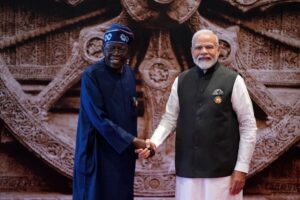Nigeria Seeks to Join G20 as a Permanent Member
 Nigeria, the largest economy in Africa, has expressed its interest in becoming a permanent member of the G20, the group of the world’s major economies.
Nigeria, the largest economy in Africa, has expressed its interest in becoming a permanent member of the G20, the group of the world’s major economies.
According to a statement from the presidency, Nigeria is currently consulting with various stakeholders to assess the benefits and risks of joining the G20, which accounts for 85% of global GDP and two-thirds of the world’s population. “When the consultations are completed, the government will decide whether or not it is appropriate for the country to apply,” the statement said. “The President’s participation in the G20 summit in India is part of this objective.”
Nigeria was invited to the summit by Indian Prime Minister Narendra Modi, who is hosting the event under the theme “One Earth, One Family, One Future”. Tinubu will also take part in a round-table discussion with Indian and Nigerian business leaders and industrialists, as well as hold bilateral talks to attract more foreign investment to Nigeria, one of the continent’s leading oil-producing countries.
Since taking office, Tinubu has launched a series of reforms to revive the economy and attract more investment. He has also called for a reform of the United Nations in all its three pillars – Peace and Security, Development and Human Rights – and advocated for a rules-based, non-discriminatory, free, fair, open, inclusive, equitable, sustainable and transparent multilateral trading system.
Nigeria’s bid for G20 membership is supported by South Africa, the only individual member nation from the continent in the group. South Africa’s President Cyril Ramaphosa said Nigeria’s inclusion would make the G20 more representative and inclusive of Africa’s interests and aspirations. “The G20 family is not complete until Nigeria joins too,” he said.
However, Nigeria’s ambition may face some challenges from other members who may be reluctant to expand the group or share their influence. Some analysts have also questioned whether Nigeria has the capacity and credibility to play a significant role in global affairs, given its domestic challenges such as insecurity, corruption, poverty and unemployment.


